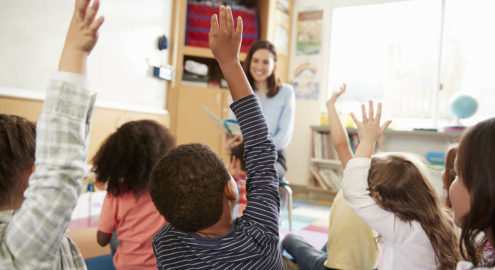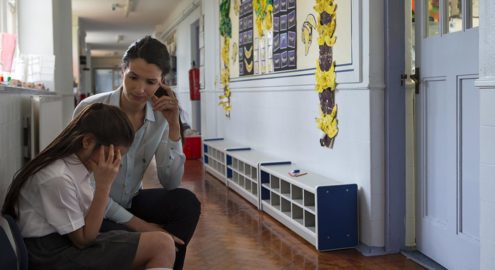What Are They?
Anyone who has spent time working knows how much of a difference relationships with colleagues can make. Oftentimes, our collegial relationships—i.e., how well we get along and work together with our coworkers—can make or break our enjoyment of a job, in school settings as much as anywhere else.
We all have a sense of what positive relationships among school faculty and staff might look like, but here’s how they have been defined in research:
- Teachers who report positive connections with their colleagues say that their coworkers are friendly and care about them.
- They say that their colleagues respect and trust each other.
- They see their coworkers as accepting and encouraging, as well as collaborative and supportive of each other’s success.
- They feel that they can communicate openly with colleagues, and can go to them for help if needed.
A teacher who is struggling to take care of elderly parents is starting to have a hard time meeting all his commitments at school. Rather than make assumptions that he is just falling down on the job, two of his colleagues approach him with kindness to find out what’s going on. As they hear this teacher’s struggles, they offer him their compassionate understanding, and together the three of them make a plan to help him through this difficult time.
A principal actively cultivates trust among staff members by asking for their input on decisions that affect them, by admitting her own mistakes, by not shying away from difficult conversations, and by expressing appreciation and gratitude for her staff. As a result, the staff feels comfortable taking risks, offering ideas, expressing concerns, and supporting one another.
Why Are They Important?
Research shows that when school staff, including teachers and administrators, have positive relationships with each other, everyone benefits—staff and students alike.
Positive collegial relationships increase teachers’ commitment to and satisfaction with their jobs.
- Student teachers who feel that colleagues at their placement schools get along well with each other are more likely to want to work at that school in the future.
- Support, both from principals/administrators and, especially, from their peers, makes teachers feel more committed to teaching as a profession.
- When teachers perceive their colleagues as compassionate towards them, they show higher levels of organizational commitment, positive emotion, and job satisfaction; they are also better able to cope with stress and less likely to experience burnout.
When teachers get along and trust each other, they help each other improve.
- Trust between colleagues—being able to count on each other, particularly in difficult situations—is important for the formation of professional learning communities.
- Teachers who received one-on-one mentoring from experienced colleagues at the beginning of their careers are more cooperative with other teachers later on.
- When teachers in learning teams have good relations with each other, they are more likely to work collaboratively.
- Interestingly, when educators develop authentic, self-driven collegial relationships based on mutual support and trust, personal and curriculum development are likely to result; on the other hand, little growth is seen when collegiality is contrived, i.e., forced by administration.
Positive relationships among staff help make student social-emotional well-being a priority.
- Teachers who feel more connected to and supported by colleagues are more likely to implement prevention programs and feel comfortable intervening in bullying between students.
Students do better academically when staff get along well.
- Research in urban high schools shows that positive staff relations lead to better school climate, which, in turn, contributes to students’ academic achievement.
- Similarly, collegial behavior between staff is one of the important factors that distinguishes high-performing from low-performing middle schools.
Practice Collections
Practices

Personal SEL Assessment and Reflection

The SEL 3 Signature Practices

Supporting SEL at Grade-Level or Content Area Team Meetings

Common Beliefs Survey: Teaching Racially and Ethnically Diverse Students

Sustaining an Open Heart

Overcoming Obstacles to an Open Heart

Self-Assessing Social and Emotional Instruction and Competencies

Quotes and Sayings: A Contemplative Practice

Positivity Journals for Teachers

Mindfully Creating Positive Relationships with Students

Three-Minute De-Stressor for Teachers

Active Listening for School Staff

Mindful Poetry Moments

Modeling SEL for Students

Mindful Music Moments

Reading Ourselves Whole: A Contemplative Choral Reading Method

I See You. Everyone Matters.

Feeling Connected for Adults

Do you want to dive deeper into the science behind our GGIE practices? Enroll in one of our online courses for educators!




